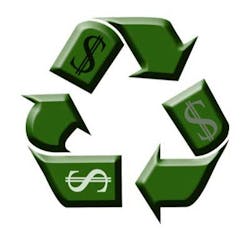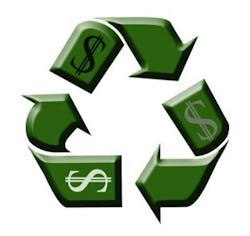Recycling dental precious metals waste
By Bill Rockett
These days, almost anything we use in our daily lives can be recycled – from computers and refrigerators to plastic containers or tires. Some of these items carry intrinsic value, such as the gold in computers, which can be extracted by recyclers to help offset the cost of processing. Many people are not aware that when they dispose of these valuable recyclables, they are throwing away precious metals that can be refined and sold for market value.Similarly, some dental professionals are not aware that they may be inadvertently disposing of valuable materials that can be recycled for a profit. Waste crowns and bridges and metal grindings from gold filings can all be recycled through a precious metals refiner for a return profit, bringing in additional income for the office. In the current economy, when budgets are stretched thin, each additional form of income is helpful. Perhaps some dental professionals do not recycle valuable office waste because they are unsure of the process or how it works. It is our hope that the following information will help answer some questions and allow more offices to take advantage of the income they can generate through reclaimed metal recyclables. What can be recycled?Recyclable waste from dental offices can be divided into two distinct groups – hazardous and nonhazardous; the primary difference being that hazardous waste is regulated at a federal or state level with strict guidelines for collection and disposal, and nonhazardous waste is not. Hazardous waste can include amalgam, waste mercury, X-ray fixers, developers, and film packets, and chemiclave chemicals. Lead and mercury in these wastes is harmful to the environment and must be sent to a licensed recycler who can properly extract the hazardous materials before further processing takes place. Amalgam fillings are made up of a mixture of materials, which can include toxic elemental mercury, silver, zinc, tin, and copper. Because mercury is released into the air when incinerated, amalgam must not be disposed of with biomedical waste, but separately with a mail-away or pick-up service. Nonhazardous waste is not regulated, leaving many dental professionals unsure of what to do in order to ensure they retrieve any possible value before final disposal. When crowns, bridges, or fillings are removed, the resulting precious metals can be sent away to a refiner, who processes the waste and extracts valuable metals for resale. The most prominent precious metal contained in dental waste is 16K gold. In addition to office waste, dental lab waste such as grindings and investment waste from castings can also be sent to recyclers who can extract valuable metals. Molds for crowns and appliances can take in small amounts of gold with each casting; when a lab is finished with the die, it can be broken down by a recycler in order to pull out the gold embedded in the mold. Why recycle? There are two main reasons why recycling nonhazardous dental waste is important: financial and environmental. Financial return from the refined gold can help offset office costs and boost profits; not taking advantage of this benefit is akin to throwing away income. Additionally, the office will be promoting sustainable business practices by contributing recycled metals back into the production stream, which helps reduce the amount of resources spent on mining unique materials. How the process worksPrecious metals refiners can accept materials in-person, through drop-off or pick-up services, or via mail. Resources such as city, county, or state recycling Web sites, or groups such as the American Dental Association are reliable resources for finding reputable recyclers. Once the recycler receives the waste, they will use one of several methods to separate the nonmetal content from the valuable metal content. The method we recommend as the most effective and most environmentally sound is acid reduction, which separates the dental gold from the porcelain, dissolving the nonprecious alloys and resulting in filtering out the gold.After the extracted metals are collected, they are weighed in order to determine the amount available for resale. Once the amount and value is determined, the dental office will receive payment from the recycler for the value of the gold (usually paid by the gram or pennyweight), minus a general refining charge. This general charge will vary with different recyclers and should be agreed upon before the process begins. Primary refiningIdeally, the recycler your dental office uses for hazardous waste will also accept nonhazardous metals for recycling. Unfortunately, this is not the case with all recyclers; many hazardous materials recyclers that recycle amalgam or waste mercury do not have the capability to refine precious metals. This means that the recycler will extract the hazardous materials from office waste and pass on the remnants to an additional recycler who will then refine the precious metal components in preparation for resale. A better choice for dental offices is a “primary refiner.”When a primary refiner receives precious metals waste, all processing takes place with that single company. This not only reduces the amount of time necessary to refine the materials, which results in a faster turnaround time for payment, it also ensures that the refining process is more efficient. Nonprimary refiners can take up to 45 days to process payment, while primary refiners can turn around the process in as little as five days. Additional considerationsOnce your dental office is participating in sustainable business practices by recycling both hazardous and nonhazardous waste, make sure that other “green” initiatives are being taken too. Often recycling costs less than trash pick-up, so don’t forget to recycle nonmetal items, as well, like paper, aluminum, glass, and toner cartridges. Call your city’s solid waste department or visit www.earth911.com to find out what options you have for recycling office waste.
Bill Rockett is the vice president of M&K Recovery Group, a precious metals refiner and electronics recycler with locations in North Andover, Mass., and Austin, Texas. He can be reached at [email protected].


